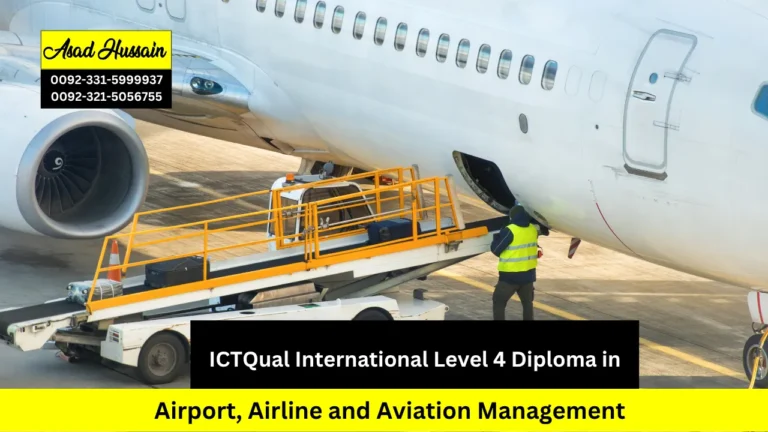The hospitality and tourism industry is a vibrant and dynamic field that offers numerous career opportunities around the globe. With the sector continuously evolving and expanding, there is a growing demand for skilled professionals who can navigate its complexities and drive success. One such credential that equips individuals with the necessary skills and knowledge is the Qualifi Level 4 Diploma in Hospitality and Tourism Management. This blog post delves into the various aspects of this diploma, highlighting its benefits, course structure, and potential career paths.
The Qualifi Level 4 Diploma in Hospitality and Tourism Management is a valuable qualification for anyone looking to build a successful career in these dynamic industries. With its industry-relevant curriculum, flexibility, and global recognition, this diploma equips learners with the skills and knowledge needed to excel. Whether you are starting your journey in hospitality and tourism or seeking to advance your career, this diploma offers a pathway to numerous exciting opportunities.
Embark on your journey today and unlock the doors to a rewarding career in hospitality and tourism management.
Program Highlights
The Qualifi Level 4 Diploma in Hospitality and Tourism Management consist of 120 credits for the completed qualification.
Mandatory Units
- Sustainability in Tourism and Hospitality Management
- Operations Management in Tourism and Resort Operations
- Management of Visitor Attractions
- Employability and Development in the Hospitality Industry
- demonstrated some ability and possess qualifications at Level 3, for example ‘A’ Levels or vocational awards;
- spent some time in an organisational role and shown they have capability and drive to develop;
- seeking further professional development and to gain work related skills and know-how.
Sustainability in Tourism and Hospitality Management
- Understand the principles of sustainability in tourism and hospitality:
- Define sustainability and its importance in the tourism and hospitality sectors.
- Analyze the impact of tourism on the environment and local communities.
- Evaluate sustainable practices in the industry:
- Identify best practices for sustainable tourism and hospitality management.
- Assess the effectiveness of current sustainability initiatives within organizations.
- Develop strategies for sustainable operations:
- Formulate plans to implement sustainable practices in tourism and hospitality operations.
- Propose measures to minimize the environmental footprint of tourism activities.
- Analyze the role of stakeholders in promoting sustainability:
- Examine the responsibilities of various stakeholders, including businesses, governments, and tourists, in sustainability efforts.
- Discuss collaboration strategies among stakeholders to enhance sustainability.
Operations Management in Tourism and Resort Operations
- Understand the fundamentals of operations management in tourism and resort settings:
- Explain the key concepts and principles of operations management.
- Describe the operational processes specific to tourism and resort management.
- Evaluate operational performance:
- Assess the efficiency and effectiveness of operational processes in tourism and resort operations.
- Identify key performance indicators (KPIs) and metrics used in the industry.
- Develop strategies for optimizing operations:
- Formulate plans to improve operational efficiency and service quality.
- Implement best practices in resource management, supply chain management, and customer service.
- Analyze the impact of technology on operations management:
- Discuss the role of technology in enhancing operational processes.
- Evaluate the use of information systems and automation in tourism and resort operations.
Management of Visitor Attractions
- Understand the principles of managing visitor attractions:
- Define visitor attractions and their significance in the tourism industry.
- Explain the key concepts and principles of visitor attraction management.
- Evaluate visitor experience and satisfaction:
- Assess the factors influencing visitor experience and satisfaction.
- Develop strategies to enhance visitor engagement and enjoyment.
- Develop marketing and promotion strategies for visitor attractions:
- Create marketing plans to attract and retain visitors.
- Utilize various marketing channels and techniques to promote visitor attractions.
- Analyze the financial and operational aspects of managing visitor attractions:
- Examine budgeting, revenue management, and financial planning for visitor attractions.
- Evaluate operational challenges and propose solutions for effective management.
Employability and Development in the Hospitality Industry
- Understand the key skills and competencies required in the hospitality industry:
- Identify essential skills and attributes for successful careers in hospitality.
- Analyze the role of soft skills, such as communication and teamwork, in the industry.
- Evaluate career opportunities and pathways in hospitality:
- Explore various career options and advancement opportunities within the hospitality sector.
- Assess the qualifications and experiences needed for different roles.
- Develop strategies for personal and professional development:
- Create a personal development plan to enhance employability and career growth.
- Identify training and educational opportunities to acquire relevant skills and knowledge.
- Analyze the role of networking and professional organizations in career development:
- Discuss the importance of networking and building professional relationships in the hospitality industry.
- Evaluate the benefits of joining professional organizations and associations.
These learning outcomes provide a comprehensive framework for what students should achieve by the end of each study unit.
The Qualifi Level 4 Diploma in Hospitality and Tourism Management is designed for a diverse range of individuals seeking to advance their careers in the dynamic hospitality and tourism sectors. It is ideal for aspiring professionals who are new to the industry and want to build a strong foundation in hospitality and tourism management principles. Additionally, the course is well-suited for current industry professionals aiming to enhance their skills, gain a deeper understanding of management practices, and move into higher-level positions. Entrepreneurs looking to start their own ventures in the hospitality and tourism field will also find the course invaluable, as it covers essential aspects of business operations and strategic planning. Furthermore, recent graduates from related disciplines who wish to specialize in hospitality and tourism management will benefit from the comprehensive and industry-relevant curriculum. Overall, this course caters to anyone passionate about making a significant impact in the hospitality and tourism industries, providing them with the knowledge and skills needed to excel.







